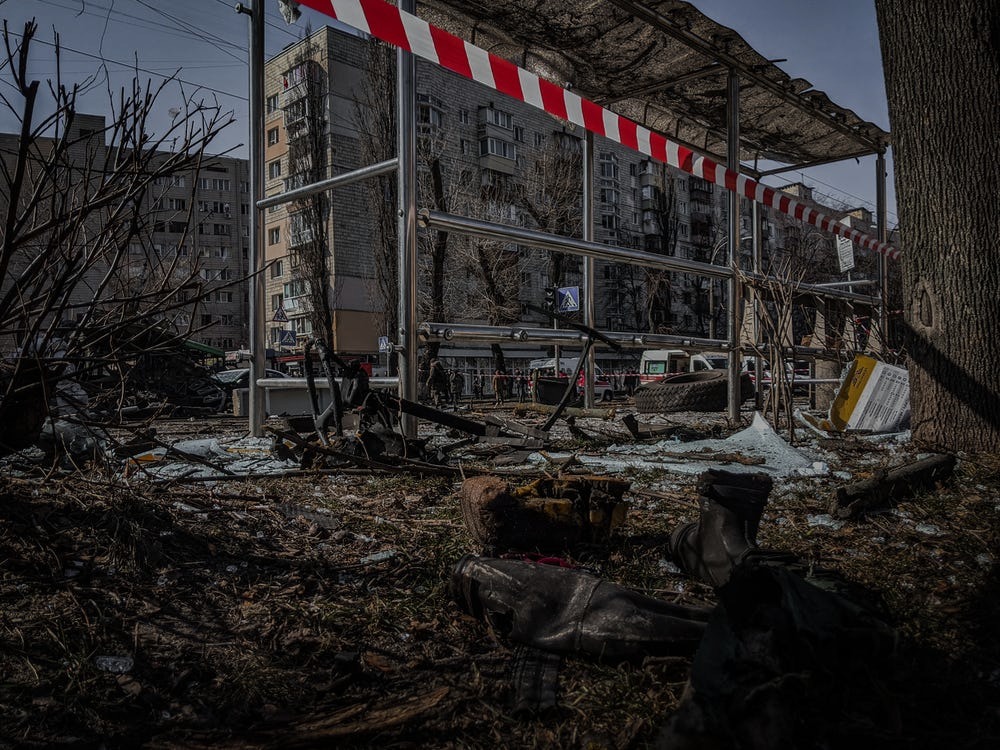
The Most Humane Goal For Ukraine Is The Quickest Negotiated Settlement Possible
This essay was originally published by The Federalist on March 24, 2022.
It is not ‘appeasement’ of Putin to try to find a negotiated way out of the war. It is elementary humaneness — and hard-headed realism.
As the war in Ukraine grinds on, there are mildly encouraging signs of a negotiated settlement. Russian President Vladimir Putin reportedly has outlined to his Turkish counterpart Recep Erdogan a set of terms that might provide the starting point for a compromise peace. Ukrainian President Volodymyr Zelensky’s statement that Ukraine will not join the North Atlantic Treaty Organization (NATO) also opens the door to an agreement.
Nonetheless, the risks of a longer, larger war in which NATO forces confront Russian ones remain alarmingly high. The humanitarian consequences of a wider and more protracted conflict would be devastating — not only for the Ukrainian people, the Russian people, and the people of the West, but especially for the global poor. In their interest, a negotiated settlement is imperative.
But the attitude of the Biden administration to the promising signs of a settlement is unclear. It may well be that the Biden administration wants to decapitate Putin and force regime change on Russia.
The War Party inside the United States is still loudly beating its drums. Some Western analysts do not find the risk of nuclear war at all daunting. Only about 35 percent of the American public says it favors military action to help Ukraine even at the risk of a nuclear war with Russia over Ukraine.
Purpose of Sanctions
U.S. sanctions, originally intended to forestall a Russian invasion and then to stop its advance, failed miserably in those objectives. If they serve any purpose now other than vindictiveness, that purpose seems to be to crash the Russian economy, inflict the maximum hardship on the Russian people, and provoke either a popular uprising against Putin, a military takeover, or a successful assassination of Russia’s leader.
What is expected to happen after regime change is anybody’s guess. A Russian version of North Korea, perhaps? A Russia that will become the satellite of China — China’s very own Belarus?
But because even extreme and unprecedented sanctions take time to produce their effects, the Biden administration appears to want to buy that time by encouraging the Ukrainians to fight to the bitter end — although without exposing NATO forces to the dangers of combat. Remember that during the war in Kosovo, NATO pilots were instructed to fire on their targets from altitudes that put them beyond the reach of Serb anti-aircraft fire, but that endangered civilians below. Some lives matter; others apparently not as much.
If this is the U.S. strategy, it may work — but at what cost?
The calls in the West for enlarging and prolonging the conflict seem on the surface to be motivated by humanitarian concerns. No one can look at the suffering of innocent Ukrainian people on the nightly news and not be moved by compassion. But humanitarianism requires peace, even a bad peace, rather than a longer and larger war.
Famine in the World’s Poorest Nations
The head of the United Nations’ Food and Agriculture Organization recently painted a frightening picture of the effects of the Russian-Ukraine conflict on global food supplies.
Consider wheat. Wheat is a staple food for more than 35 percent of the world’s population. Fifty countries depend on Russia and Ukraine for 30 percent or more of their wheat supply. Many of those countries are low-income, food deficit countries in North Africa, Asia, or the Middle East.
Egypt, Turkey, Bangladesh, and Iran buy more than 60 percent of their wheat from Russia and Ukraine. Lebanon, Tunisia, Yemen, Libya, and Pakistan also rely heavily on those two countries for their wheat supply. A continuation of the conflict could severely disrupt agricultural production in both Ukraine and Russia.
Ukraine’s cereal crops would normally be ready for harvesting this June, but it is unclear whether Ukrainian farmers will be able to harvest and deliver them. If ports on the Black Sea are closed, the situation will be even worse.
In other words, mass starvation looms in many of the poorest and most vulnerable nations of the world if the conflict continues or intensifies. There is thus a humanitarian imperative to end it swiftly. If the war becomes a test of wills between Russia and NATO, the poor of Egypt and Bangladesh will be its silent victims.
U.S. Security Interest in Preventing Famine
It is not “appeasement” of Putin to try to find a negotiated way out of the war. It is elementary humaneness. But it is also hard-headed realism.
A famine in Egypt could destabilize the government of that major American ally and throw the Middle East into utter confusion. Acute food shortages in India could drive that great Asian democracy (and potential counterweight to China) away from the United States and closer to Russia and China. It is illusory to believe that U.S. actions have isolated Russia and left it an international pariah.
Even apart from humanitarianism, then, a sober calculation of America’s vital security interests requires consideration of the second- and third-order effects of our current strategy. Admiration for the courage of the Ukrainian resistance, indignation at Russian aggression, or compassion for its people should not blind us to the disasters, both humanitarian and strategic, that will result if the war does not end soon.

 Twitter
Twitter
 Facebook
Facebook